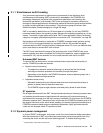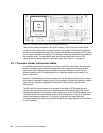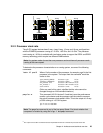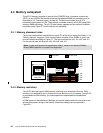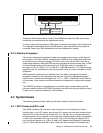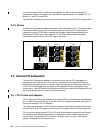
Chapter 2. Architecture and technical overview 25
Figure 2-6 Logical p5-570 building blocks connection
2.2.2 Processor clock rate
The p5-570 system features base 2-way, 4-way, 8-way, 12-way, and 16-way configurations
with the POWER5 processor running at 1.5 GHz, 1.65 GHz, and 1.9 GHz. The processor
card running at 1.9 GHz is available with two feature codes to support the DDR1 and DDR2
memory technology, which require two different DIMM sockets.
To determine the processor characteristics on a running system, use one of the following
commands:
lsattr -El procX Where X is the number of the processor; for example, proc0 is the first
processor in the system. The output from the command
3
would be
similar to this:
type powerPC_POWER5 Processor type False
frequency 165600000 Processor Speed False
smt_enabled true Processor SMT enabled False
smt_threads 2 Processor SMT threads False
state enable Processor state False
(False, as used in this output, signifies that the value cannot be
changed through an AIX command interface.)
pmcycles -m This command (AIX 5L Version 5.3 and later) uses the performance
monitor cycle counter and the processor real-time clock to measure
the actual processor clock speed in MHz. This is the output of a 2-way
p5-550 running at 1.65 GHz system:
Cpu 0 runs at 1656 MHz
Cpu 1 runs at 1656 MHz
pSeries
pSeries
pSeries
pSeries
pSeries
pSeries
pSeries
pSeries
pSeriespSeriespSeries
pSeriespSeriespSeries
pSeriespSeriespSeries
pSeriespSeriespSeries
pSerie s
pSerie s
pSerie s
pSerie spSe riespSerie s
pSerie spSe riespSerie s
pSerie spSe riespSerie s
16-way12-way
pSerie spSe riespSerie s
2-, 4-way
8-way
pSerie s
pSerie s
pSerie spSe riespSerie s
pSerie spSe riespSerie s
FC 1847 FC 1849FC 1848
Note: Any system made of more than one processor card must have all processor cards
running at the same speed.
3
The output of the lsattr command has been expanded with AIX 5L to include the processor clock rate.
Note: The pmcycles command is part of the bos.pmapi fileset. First check whether that
component is installed by using the lslpp -l bos.pmapi command.







